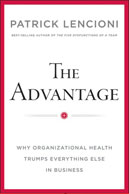July 2012: In This Issue
This edition of "A New Leaf" offers insight into the important areas of organizational health and your personal ability to change. The featured book review of "The Advantage" defines and identifies six key questions assessing the "health" of your organization. Our feature article provides three important questions to consider in assessing whether you are positioned for sustainable personal growth and development.
See Change Management remains fully engaged in working closely with both leaders and their organizations in improving their health and development. Second quarter activity included:
- Continuing to lead the financial and organizational restructuring of a $50 million family owned business
- Facilitating a strategic planning and team building process for a global leader in the design and manufacturing of microscopy imaging equipment
- Challenging three management teams as to progress related to their 2012 strategic planning goals and objectives
- Engaging in leadership coaching with six C-level leaders dedicated to performance improvement.
With the perceived slowing of national and global economic growth, it is now more important than ever to ensure personal and organizational alignment with your critical success factors. Continued best of luck during this summer season in challenging yourself and your team to turn a new leaf in reacting to your current challenges and opportunities.
- Mike
 Book Review: "The Advantage"
Book Review: "The Advantage"
For over a decade, Patrick Lencioni has authored numerous best sellers on important business topics ranging from dysfunctional teams to organizational silos, meeting schedules and obsessions of CEO's. In his most recent best seller, "The Advantage", Lencioni combines all the best practices from his prior books to address what he posits is the single most important competitive advantage available to all businesses…..their organizational health.
Lencioni defines organizational health as a state where an organization "is whole, consistent, and complete, that is, when management, operations, strategy and culture fit together and make sense". The four key disciplines of his health model include building a cohesive leadership team, creating clarity, over communicating clarity and creating systems to reinforce clarity at all levels.
In addressing the key discipline of building a cohesive leadership team, Lencioni relies on the functional team model first introduced in his highly regarded "The Five Dysfunctions of a Team". For a team to be functional under this model, it must possess a high level of trust, embrace conflict, be successful at obtaining commitment, foster accountability and be focused on thematic, team based results. The more effective a team is in addressing these key areas, the more likely they will be in achieving their goals.
The most important discipline of Lencioni's organizational health relates to the need for organizational clarity. He defines this clarity as the leadership team being intellectually aligned and committed to the same answers to the following six simple but critical questions:
"Why do we exist?"
"How do we behave?"
"What do we do?"
"How will we succeed?"
"What is most important, right now?"
"Who must do what?"
Lencioni acknowledges that answering these questions is not an overnight exercise. He is quick to point out thought that "more than getting the right answer, its often more important to simply have an answer-one that is directionally correct and around which all team members can commit." While the author chooses not to acknowledge this, answers to many of these questions may already exist within a company. Feedback as to "why do we exist" may be currently captured in a company's vision statement. "How do we behave" may be articulated in the company's values. "What do we do" may be found in a company's mission statement. Guidance to the final three questions may be previously addressed as part of a dynamic planning process.
Having addressed the important need for "clarity, "The Advantage" shares insights into how best to communicate and reinforce this prerequisite to organizational health. Checklists are provided for leaders to assess how their organization measures up for each of the four key disciplines.
In closing, Lencioni states that "as more and more leaders come to the realization that the last frontier of competitive advantage will be the transformation of unhealthy organizations into healthy ones, there will be a shift in the mind set of executives away from the technical pursuits and toward the disciplines outlined in (his) book". As a leader, if you are committed to improving the health of your organization, a thoughtful reading of "The Advantage" will provide you with a roadmap as to how to get there.
 Feature Article: Are You Ready to be Coached?
Feature Article: Are You Ready to be Coached?
Effective coaching has long been heralded as a critical component in the pursuit of excellence. Nowhere has this role been more prominent than in team athletics, where the reputations of Vince Lombardi (Green Bay Packers) and Phil Jackson (Chicago Bulls/L.A. Lakers) have reached legendary proportions. Researchers have recently extolled the virtues of senior executives aligning themselves in a successful coaching relationship to resolve challenges ranging from job performance to business/personal life balance. The benefits of such a relationship can only be maximized when the person being coached (PBC) is personally prepared for the challenging, goal directed exercise that lies ahead.
As a means of assessing this personal preparation, the PBC is encouraged to undergo a process of introspection, thoughtfully considering and resolving all internal issues related to the following three questions:
Am I committed to improving my current situation (i.e. do I truly want to change)?
Am I prepared to accept attitudinal and other changes on my part will be required to overcome my current challenges (i.e. I recognize I may be part of the problem)?
Am I prepared to do whatever is personally necessary to be part of the solution? (i.e. Am I ready to address my own problems as part of the personal growth process?)
Only after the PBC accepts the importance of the above questions and is prepared to positively address them as part of the coaching process should they proceed with initiating a search for the right coach.
Following is a summary of why affirmative responses to the above questions are integral to the success of the PBC in a coaching relationship:
Am I committed to improving my current situation?
The primary goal of a developmental coach is the success of the PBC. Only the PBC can define what success in their eyes is. Accordingly, the PBC must be able to articulate where they seek change in their current situation.
Once the PBC has successfully clarified the root cause of the need for improvement, they must then assess their personal level of commitment to change. The desire for change cannot, nor should it be, directed or created by the coach. Only when the PBC affirms the existence of an unsatisfied need and that they are truly committed to improving upon it can the coach become an effective catalyst in assisting them in successful transformation.
Am I prepared to accept attitudinal and other changes on my part will be required to overcome my current challenges?
The result of a successful coaching relationship ultimately is the PBC experiencing revelatory change advancing them towards the achievement of their pre-determined goals. For this to occur, the PBC must accept that the solution will begin .... and end..... with them. The coaching relationship does not attempt to and cannot effect change with any person other than the PBC. The PBC must be willing to acknowledge their own blind spots and shortcomings to effectively address how they can improve their own situation. Absent this acknowledgment, the PBC likely will be unwilling to deal effectively with the real coachable issue, that the answer lies within them and oftentimes requires a paradigm shift of their own to become more effective.
Am I prepared to do whatever is personally necessary to be part of the solution?
Once the PBC has identified a need for change and acknowledged their own role in the transformation process, they must resolve to do whatever is necessary to effect their personal change. The PBC must be prepared to examine, assess and forego feelings based upon past experiences and internal filters as a means of moving forward. Transforming beliefs, attitudes and habits will be necessary to give rise to the paradigm shift required for personal transformation. If the PBC knowingly is not prepared to forego where they have been to get to where they would like to be, their transformation will be doomed from the start.
After a PBC has affirmed their response to the three key questions above, a coaching relationship can prove to be unlike any other in their life. It will focus solely on how the PBC can personally be the best they can be. If this type of personal growth is a goal of yours, ask yourself the three key questions above to determine if you are ready for coaching. If you cannot be affirmative in your response, challenge yourself as to how you are going to get there!
©2013 See Change Management. All Rights Reserved. Site credit


